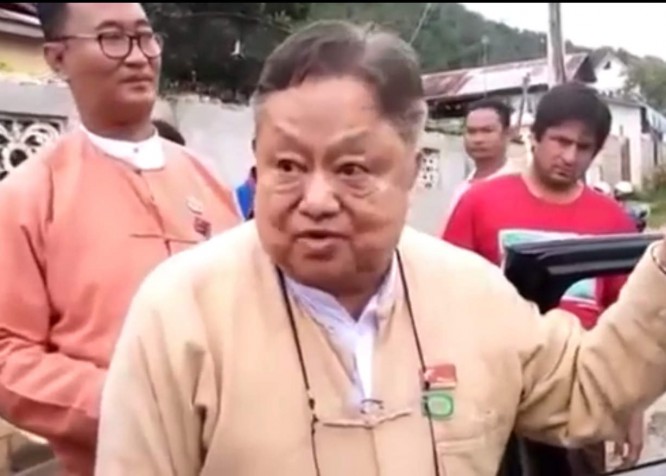Win Htein, a Central Executive Committee member for the ruling National League for Democracy (NLD), yesterday blamed low voter turnout for his party’s failure to recreate the landslide victory it enjoyed at the 2015 general election.
Speaking at a press conference in Naypyidaw after Burma’s election commission had announced that the NLD had won nine of the 19 constituencies up for grabs in Saturday’s by-elections, Win Htein said, “The reason [the NLD did not win every seat] is that so few eligible voters came out.
“Even in areas such as Rangoon, only about 30 percent turned out. In 2015, in some areas, 60 percent of people voted, in other areas 70 percent.”
The party veteran, himself a by-election winner in Meikhtila in 2012, was speaking after results were declared in several ethnic areas, where the NLD only managed to capture one seat – in Shan State’s Yawnghwe constituency where party candidate Khin Maung Win won with 51 percent of the votes.
In other by-election results from Shan State, the military-backed Union Solidarity and Development Party (USDP) won two seats while the Shan Nationalities League for Democracy won all Lower House and regional assembly seats in Mong Hsu and Kehsi, where polls had been suspended in 2015 due to armed conflict.
The biggest upset came in Mon State, where the USDP turned over a large NLD majority from the 2015 polls to take the vacant Lower House seat in Chaungzone constituency.
Voters are thought to have turned against the ruling party after the NLD-led Lower House recently passed a controversial motion to rename a bridge in the area after Gen. Aung San, Burma’s independence hero and father of current de facto leader Aung San Suu Kyi.
Questioned by reporters about the upset in Chaungzone, Win Htein responded: “In Chaungzone, people didn’t come out to vote. Apart from that, the ethnic Mon parties are not strong. There were just two Mon candidates from two Mon parties. So, at least now there is something for people to talk about in Chaungzone.”
Speaking to DVB in an exclusive interview yesterday, winning USDP candidate Aung Kyi Thein dismissed the notion that the Aung San Bridge dispute had influenced the result, instead attributing his own local roots for the victory.
“The [bridge dispute] did not influence the polls that much,” he said. “The only thing is that [NLD candidate] U Aye Win is not a local lad, whereas I was born in Kwam Rite village in Chaungzone. There were not many other factors at play.”
In Shan State, where the local SNLD won comfortably at most polling stations, Win Htein attributed the NLD’s poor showing to a language barrier.
“We are not very strong in Shan State,” he told reporters. “The main reason is because we can’t speak Shan Language. In that area, only two out of every 10 persons can speak Burmese. So, they didn’t understand our campaign where we were speaking in Burmese.”
[related]
Meanwhile in western Burma, Arakan National Party chairman Dr Aye Maung came back from his defeat in the 2015 general election to capture a Lower House seat representing the 75,800 eligible voters of Ann Township.
He immediately called for the people of Arakan State, officially known as Rakhine, to receive an equitable share of benefits from the region’s rich natural resources.
Speaking to reporters yesterday in front of the election commission office in Ann, he said, “I will fight in parliament to redistribute the benefits from the natural resources coming from Arakan State. How much of our resources have already been taken? How much was given back to ethnic regions for rebuilding? Is it a fair share?”
He added: “You can see how people in our region are suffering. Look at how many of our resources were taken from the state. And what percentage did we get back? If they took 100, did they even give us back one percent?”
The ANP’s Aye Maung won the Ann by-election with 21,794 votes, while the USDP came in second with 11,545 votes and the NLD third with 1,877 votes.
Additional reporting from Chaungzone, Mon State, by DVB’s Min Ko Thant.



